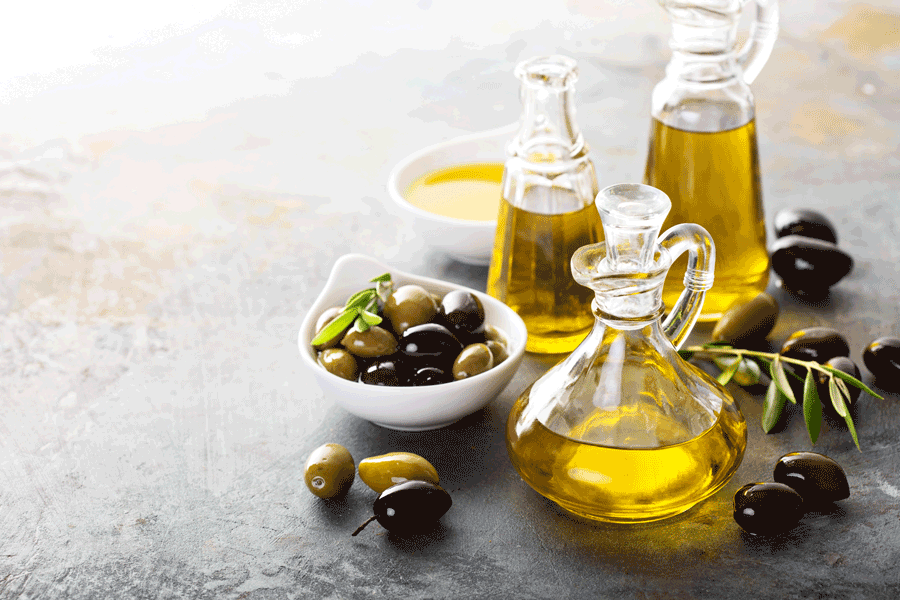Did you know that by simply adding healthy fats and oils to your eating plan you can become privy to a plethora of health and wellness benefits? These benefits range from decreased cholesterol levels and reduced inflammation to shinier hair, healthier looking skin and a boosted immune system. Although fat-free and reduced-oil food products are still extremely popular it is important to be able to distinguish between good and bad fats. Foods with polyunsaturated and monounsaturated fats are of vital importance to your health according to the Centers for Disease Control and Prevention (CDC). While some oils are most beneficial when used in cooking or baking, others can be of great value in a more topical manner.
Olive oil
Produced by pressing whole olives, olive oil is high in healthy monounsaturated fats and boasts a number of health benefits including improving cardiac health and acting as a potent antioxidant and anti-inflammatory. According to Sara Haas, spokeswoman for the American Academy of Nutrition and Dietetics, olive oil is best when
used to drizzle over salads, pasta and bread but has a low smoke point, so avoid trying to fry with it. As far as nutritional value is concerned, olive oil contains approximately 120 calories and 14g of fat per tablespoon and is considered one of the healthiest fats by the United States Department of Agriculture Agricultural Research Service (USDA).

Chia seed oil
If you haven’t yet introduced chia seed oil into your life you are missing out on a heap of astonishing benefits. The mild, somewhat nutty taste of chia seed oil makes it ideal to use in salad dressings and as an addition to smoothies, providing your body with ample amounts of omega-3 fatty acids. When mixed into dishes the oil is almost undetectable, making it possible for you to easily add it to your oatmeal, cold soups and even yogurt. The oil is both sodium and cholesterol-free and can boost your cardiac health while reducing the risk of blood clots as well as inflammation. Apart from being a great addition to any kitchen, chia oil can also be used to nourish the skin, leaving it well-hydrated and more radiant-looking than ever before.
Algae oil
Algae oil is undoubtedly the new kid on the block as far as healthy fats are concerned. Although the source of the oil – algae – might seem dubious to some, it renders an oil that is impressively healthy. The algae used to manufacture the oil is expertly grown in fermenters where it feeds on plant sugars, a process that encourages the production of nutrient-dense oil that is loaded with omega-3 fatty acids which are vital for brain and cardiac health. Algae oil boasts 130 calories and only 5g of saturated fat per tablespoon – the lowest of any cooking oil. If you are hesitant to cook with algae oil, don’t be. The oil has a clean, slightly lemony flavor and can be used for cooking, baking and in salad dressings. It also has a very high smoke point making it ideal for frying, searing and sautéing.
Avocado oil
The humble avocado has been hailed a superfood for quite some time and it is only fair that avocado oil shares some of its fame. The health benefits of this flavorsome oil include combating aging, improving blood health, regulating the metabolism, fighting arthritis and maintaining dental health. As a topical application, it can also improve your skin elasticity and repair dry and damaged hair. As far as fatty acids are concerned, avocado oil possesses a nutritional profile very similar to that of olive oil. Avocado oil is also a carrier and catalyst as far as the biological uses of numerous vitamins are concerned, significantly improving the absorption of carotenoids. Avocado oil can be liberally drizzled on soups, bread, and vegetables and also has a high smoke point which makes it ideal for searing meat and frying food.
By incorporating any, or all, of the above healthy oils into your diet you will not only maintain a healthy cholesterol level but reap countless other health benefits as well. Make a point of keeping healthy oils in your kitchen so that you have absolutely no excuse to reach for a bottle of unhealthy processed vegetable oil next time you are cooking or baking for the family.
Post written by Jennifer Dawson.
